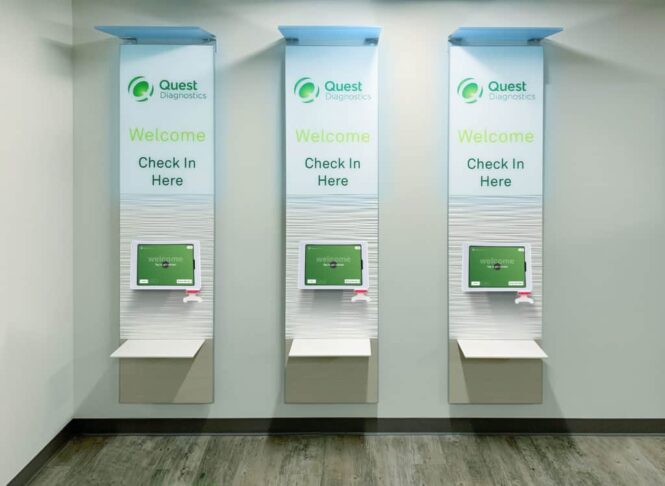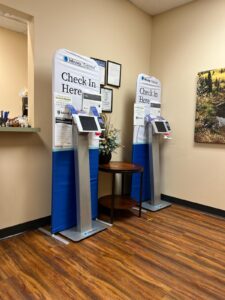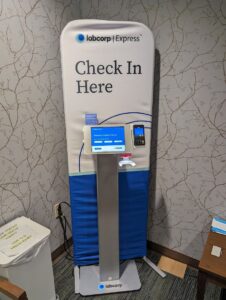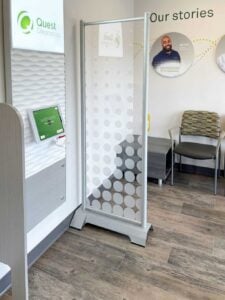
Last Updated on December 28, 2025 by Staff Writer
Accessibility Kiosks Legal News
October 26th 10am – The courts find for ACB in suit against Quest. The case involved injunctive relief. So, that means an order telling quest to fix it and attorney fees for the plaintiff. We are checking with ACB to make sure we are identifying the correct unit (aka unit violating ADA). As for an appeal, it would go to the Ninth Circuit, which tends to be more on the side of persons with disabilities than not. We imagine there could be post verdict motions. As far as cost goes, plaintiffs would be entitled to their attorney fees and the defendant would of course have to pay their own attorney fees as well. A relevant blog entry is here. Just What Is a Sales Establishment Anyway per Title III of the ADA?
Thanks to Bill for alerting us. He is a great and recommended resource. William D. Goren, Esq., J.D., LL.M., Attorney and Consultant, Americans with Disabilities Act (ADA),https://www.understandingtheada.com/. Also thanks Joe Sawicki at KIOSK for the Labcorp photo. Appears to be same model Quest is using and likely the same number of installations (2500?)
Update 11/15 Initial Look
- Latest Events
- 11/16 — November 13, 2023, Julian Vargas et al v. Quest Diagnostics Clinical Laboratories, Inc. et al, USCA Notification of Case Number, NOTIFICATION from Ninth Circuit Court of Appeals of case number assigned and briefing schedule. Appeal Docket No. 23-3436 assigned to Notice of Appeal to 9th Circuit Court of Appeals, 389 as to 23-3436 American Council of the Blind, Julian Vargas. (mat)
- 11/15 — Detailed analysis by ADA attorney William Goren
- 11/9 – Both plaintiff and defendants unhappy with lower court ruling and each are appealing. November 09, 2023 Julian Vargas et al v. Quest Diagnostics Clinical Laboratories, Inc. et al Appeal to 9th Circuit Court of Appeals NOTICE OF APPEAL to the 9th Circuit Court of Appeals filed by Plaintiffs American Council of the Blind, Julian Vargas. Appeal of Judgment,, 378 , Order on Motion to Certify Class Action,,, 190 . (Appeal Fee – $505 Fee Paid, Receipt No. ACACDC-36386305.) (Miller, Jonathan) — thanks to https://www.understandingtheada.com/
- Our Predictions
- Our understanding would be that attorney fees and any remediation would likely get put on hold while it is appealed. Certainly, you would expect the defense to ask for a stay until the appeal is resolved.
- QD contemplating $6M remediation + attorney fees. They may have delayed that outcome via the suggestion they might have to fix it now, and then 2 months later have a whole new “fix list” to do via U.S. Access Board regs in December.
-
Another look at Labcorp. Click for full size. Thanks to Joe Sawicki at KIOSK for sending this photo in. https://www.linkedin.com/in/joe-sawicki-2b570642/
Several points regarding attended, un-attended, usually not attended and more
- iPad includes a screen reader software but just the one dataport which proves critical
- Not sure what QD does when they have to replace the iPads a year from now
- Injunctive Relief Requested — Plaintiffs seek a permanent injunction requiring Quest to modify the Kiosks to include (a) screen reader capability, (b) screen magnification capability, (c) tactile controls, (d) speech output privately available through headphones, (e) volume control, (f) the ability to repeat speech, and (g) Braille instructions indicating how to start speech.
- Dr. Montgomery recommends a tactile keypad that could be 6attached to the iPad using an adaptor. Montgomery Decl. ¶ 62. The particular model discussed by Dr. Montgomery costs $309.75 per unit, and has both tactile navigation keys and an external headphone jack. Id. Dr. Montgomery indicates that a device like this could lower maintenance costs, because an external headphone jack would be easier to replace than the iPad’s internal headphone jack.
- Quest identified several potential logistical obstacles to Dr. Montgomery’s recommendations. For example, Dr. Montgomery testified that a hole could be manually drilled into the existing enclosure to allow for access to the iPad’s headphone jack. Day 3 Tr. at 118:1–3. But Walsh testified that doing so would void Quest’s warranty for the product. Day 4 Tr. at 57:20–24. Walsh also testified that adding a keyboard and potentially headphones would necessarily add new, breakable parts, which, unlike the iPad, would not be securely housed in an enclosure. Walsh Decl. ¶ 7(a). Moreover, the existing Kiosks have only one data port, and Quest needs that port to attach the camera needed to scan insurance cards. Id. at ¶ 7(b). Quest does not expect to be able to continue to use the internal headphone jack because of its understanding that both Apple and Android expect to phase out their headphone jacks over time.
- Finally, Quest emphasizes the high administrative burden of installing new physical equipment to the Kiosks. This would require training technicians in the installation and use of the equipment, and would necessitate new training for PSC staff. Walsh Decl. ¶ 7(d). Because the rollout would take years to effectuate, Quest staff would be required to monitor and maintain two parallel systems until the rollout was completed. Id. at ¶ 7(f) Quest would have to rewrite its software as well as update hardware.
- Instead, “[p]public accommodations must start by considering how their facilities are used by non-disabled guests and then take reasonable steps to provide disabled guests with a like experience.” Baughman v. Walt Disney World Co.
- There is no dispute that Vargas and the Class could not use the Original Kiosks at the Quest PSCs without assistance. Phlebotomist assistance—which Quest contends was the “auxiliary service” offered to make the Original Kiosks accessible—was not readily available to Class Members to enable them to have an experience like that of sighted patients. It is undisputed that Quest generally does not have a receptionist or attendant in the waiting room. See, e.g., Trial Ex. 13 (acknowledging that having a person available to ask for help was “not a reality for our locations”)
- Making the changes requested by Plaintiffs would require Quest to forgo certain changes it has or intends to make to the Kiosks, because Quest wishes to use the single headphone jack in the existing Kiosks to connect a device that can be used to scan insurance cards. Indeed, Quest already does use the headphone jack for that purpose at many of its PSCs. Moreover, the changes requested would require Quest to reprogram its Kiosks and to revamp the physical Kiosks at each of its locations. Finally, although Quest does not emphasize this factor, DOJ’s ANPRM indicates that regulations that would require modifications similar to those requested by Plaintiffs are forthcoming from DOJ. As a practical matter, if the Court ordered the modifications sought by Plaintiffs, Quest may be required to revamp its Kiosks twice: first to comply with this Court’s injunction, and then a second time, to comply with the DOJ’s regulations.
- Documents
- Forthcoming Regulations
The Department of Justice (“DOJ”) has issued an Advance Notice of Proposed 6Rulemaking (“ANPRM”) seeking comments on a proposal to promulgate regulations regarding accessibility of self-service kiosks. See Self-Service Transaction Machines and Self-Service Kiosks, 87 Fed. Reg. 57662 (proposed Sep. 7, 2022). In the ANPRM, the DOJ indicates that it intends to supplement the existing ADA Guidelines to require self-service kiosks to meet requirements currently applicable only to ATMs and fare machines. Id. at 57663. DOJ indicates that it will evaluate a number of potential questions, including what kiosks the new rule should cover, what technical requirements should be
incorporated, and how many accessible kiosks a location should be required to provide.
ALEXANDRIA, Va., Oct. 25, 2023 /PRNewswire/ — Following a week-long bench trial in Los Angeles, a federal court in California found Quest Diagnostics in violation of the Americans with Disabilities Act and permanently enjoined Quest from continuing to violate the ADA.
Beginning in 2016, Quest Diagnostics began to install self-service kiosks at its Patient Service Centers, which allow patients to, among other things, check in for phlebotomy appointments in a private and independent manner. Following complaints from ACB’s members that these kiosks as designed prevent people who are blind from accessing their services, ACB joined a civil rights complaint in federal court alleging that Quest’s kiosks deprived members of the blind community full and equal enjoyment of Quest’s services and failed to provide effective communication.
The Court ruled in favor of ACB and a nationwide class of blind and low-vision Quest patients. The court found that Quest violated Title III of the ADA in that Quest failed to provide people who are blind with full and equal enjoyment of Quest’s services and facilities because of their disability.
“Self-service kiosks are being used more and more in many aspects of daily public life,” said Dan Spoone, Executive Director for the American Council of the Blind. The Court’s decision that Quest violated the ADA and that the check-in services of these kiosks must be accessible to people who are blind is a significant step towards ensuring that the rights to full and equal enjoyment and effective communication are protected.
Deb Cook Lewis, ACB’s president, added, “Although the ADA is more than 30 years old, people who are blind are still forced to fight for full and equal access to healthcare. This judgment sends a clear message that full and equal enjoyment is required by law, and health care providers must ensure access for people with disabilities.”
This litigation has been led by ACB’s counsel at Nye Sterling Hale Miller and Sweet and at Handley Farah & Anderson.
Matthew Handley, one of ACB’s attorneys in the litigation, added, “Touchscreen kiosks are an ever-increasing aspect of our daily lives – this decision ensures that accessibility of those kiosks will need to be front and center in the minds of every company wishing to make use of self-service technology.”
About the American Council of the Blind
The American Council of the Blind is a national member-driven consumer organization representing Americans who are blind and visually impaired. During the organization’s 60-year history, ACB has become a leader in national, state, local, and even international advocacy efforts. With 66 affiliates, ACB strives to increase independence, security, equality of opportunity, and to improve the quality of life for all people who are blind and visually impaired. For more information, visit ACB’s website.
About Handley Farah & Anderson
Handley Farah & Anderson are lawyers who seek to improve the world. Based in Washington, D.C., they fight for: workers deprived of wages, consumers deceived about products, tenants denied access to housing, parents deprived of adequate parental leave, persons with disabilities denied access, and women and communities of color subject to discrimination.
SOURCE American Council of the Blind
More Background
ID Card Scanning
Always a pain here is a video on how Acuant used in Quest kiosk
Quest Diagnostics Streamlines Patient Check-in with Aila’s Interactive Kiosk
Quest Diagnostics selected Aila’s Interactive Kiosk as a rugged, adaptable self-service platform to create its next-generation patient check-in experience. Aila’s expertise in patient check-in for enterprise healthcare providers gave Quest the confidence that Aila could provide the technology and support to deploy a major new experience in its patient service centers. “Aila was a known solution that would work for us,” said Congersky, “this helped us avoid a lengthy product exploration process.”
The Interactive Kiosk was able to save phlebotomists’ time by automating a range of customer experiences that previously required face-to-face interaction:
- ID and insurance card scanning
- Smartphone scanning for pre-registered patients
- Digital check-in and wait list queuing
The Interactive Kiosk also provided a platform that was adaptable for Quest’s evolving check-in experience. This includes, a way for patients to check in for someone else, such as a child or parent, schedule service times on-site, and give patients the option to wait in their vehicle after checking in where they’ll receive a text message when it’s their turn.
In combination with Aila’s Interactive Kiosk and floor stand, Quest further improved the check-in experience by developing a welcome center that also included wall-mounted Interactive Kiosks. This helps guide patients to the self-service center and provides a welcoming environment to check in. Having a range of mounting options to choose from further illustrates Aila’s ability to enable ideal solutions across thousands of locations with differing layouts.







